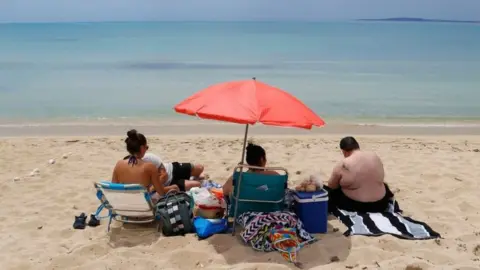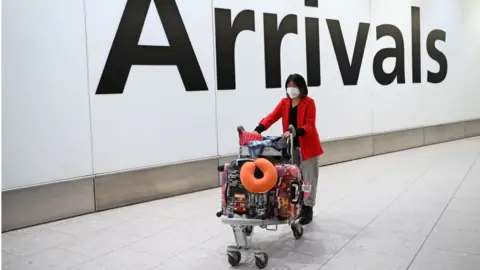Quarantine rules set by UK to be lifted for many European countries
 Reuters
ReutersUK holidaymakers could be able to travel to most of Western Europe this summer without having to quarantine.
Ministers are finalising plans for a series of "travel corridors" that will mean people arriving into the UK will not need to self-isolate.
Participating countries could include France, Italy, Spain, Greece, Belgium, Germany, Norway, the Netherlands, Turkey and Finland - but not Portugal.
Restrictions for these countries are expected to be lifted in early July.
The reason Portugal will probably not be included is due to a rise in the number of new cases in and around Lisbon.
Sweden is also unlikely to be on the list because the infection rate there is higher than in the UK.
But work is ongoing to see if a travel corridor is possible with Australia.
- Are you a holiday rep looking forward to welcoming tourists? Email: [email protected]
A travel corridor would mean that two people travelling in both directions between two countries would not have to self-isolate after they travel.
Three-week review
The UK's quarantine rules will remain in place for people arriving from other countries and it's thought that might be the case for some destinations throughout the summer.
The government has previously said that the quarantine would be reviewed every three weeks and 29 June marks the end of the first three-week period.
If a country on the list has an outbreak, then quarantine restrictions could be re-imposed. Similarly, if a country's infection rate reduces then the quarantine requirement may be lifted.
The first travel corridors could come into force on 4 July, although that date is by no means confirmed.
Transport Secretary Grant Shapps had indicated there would be an announcement on Monday.
But the BBC understands that initial details could be unveiled this weekend.

What are the current quarantine rules?
- People arriving in the UK should drive their own car to their destination, where possible, and once there they must not use public transport or taxis
- Arrivals must not go to work, school, or public areas, or have visitors - except for essential support. They are also not allowed to go out to buy food, or other essentials, where they can rely on others
- Those arriving in England, Wales and Northern Ireland could face a fine of £1,000 if they fail to self-isolate for the full 14 days, while they face a £480 fine in Scotland. The maximum fine for repeat offenders in Scotland is £5,000.
For more on the rules click here.

Anyone arriving from the Republic of Ireland, the Channel Islands or the Isle of Man does not have to complete a form or enter quarantine upon arrival in the UK.
There are also exemptions for workers in some industries such as road haulage and medical professionals who are providing essential care.
 Getty Images
Getty ImagesThe travel industry has been vocal in its criticism of the government's quarantine rules, warning that the isolation period will deter visitors and put jobs at risk. Some airlines were in the early stages of legal action.
The manufacturing industry has also highlighted that fewer flights will restrict imports and exports, which will have a knock-on effect for the freight industry, as well as hampering the recovery of some businesses.
Despite criticism from businesses, Home Secretary Priti Patel said that the measures were "proportionate" and being implemented "at the right time" when they came into effect on 8 June.
